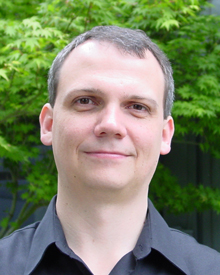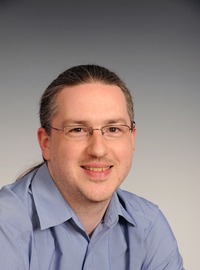The EuroMPI 2016 panellists will discuss: "Modern challenges to MPI's dominance in HPC".
- Jonathan Dursi, Ontario Institute for Cancer Research
- Bill Gropp, NCSA, University of Illinois at Urbana-Champaign
- Nicole Hemsoth, The Next Platform
- Martin Schultz, Lawrence Livermore National Laboratory
- Anthony (Tony) Skjellum, Auburn University
- Chair : Daniel Holmes, EPCC, The University of Edinburgh
Jonathan Dursi, Ontario Institute for Cancer Research: “How Can MPI Fit Into Today’s Big Computing?”

Jonathan Dursi has spent over twenty-five years using large scale scientific computing to advance science and R&D across a range of disciplines. He received his Ph.D. in astrophysics from the University of Chicago in 2004, doing very large-scale supernova simulations with the DOE ASCI ASAP program at the Flash Centre, and since then has been a senior research associate at the Canadian Institute for Theoretical Astrophysics; an analyst for SciNet, Canada’s largest HPC centre; then served a secondment as the first, interim, CTO for Compute Canada; and in 2015 moved into cancer bioinformatics at the Ontario Institute for Cancer Research, where he is a Scientific Associate and Software Engineer at the Ontario Institute for Cancer Research. At OICR, he currently works with both very large traditional genomics data sets for the international TCGA+ICGC Pancancer consortium, and still manages to do sneak in some number-crunching by way of a new genome sequencing device, the Oxford Nanopore Technologies MinION, which generates floating-point signal strength data as a strand of DNA passes through a nanopore.
_______________________________________________
Bill Gropp, NCSA, University of Illinois at Urbana-Champaign: "MPI: The Once and Future King"

William Gropp is the Thomas M. Siebel Chair in the Department of Computer Science, Director of the Parallel Computing Institute, and chief scientist of the National Center for Supercomputing Applications at the University of Illinois in Urbana-Champaign. After receiving his Ph.D. in Computer Science from Stanford University in 1982, he held the positions of assistant (1982-1988) and associate (1988-1990) professor in the Computer Science Department of Yale University. In 1990, he joined the Numerical Analysis group at Argonne, where he held the positions of Senior Scientist (1998-2007) and Associate Division Director (2000-2006). He joined Illinois in 2007. His research interests are in parallel computing, software for scientific computing, and numerical methods for partial differential equations. He is a co-author of "Using MPI: Portable Parallel Programming with the Message-Passing Interface", and is a chapter author in the MPI Forum. His current projects include Blue Waters, an extreme scale computing system, and the development of new programming systems and numerical algorithms for scalable scientific computing. He is a Fellow of ACM, IEEE, and SIAM and a member of the National Academy of Engineering.
_______________________________________________
Nicole Hemsoth, The Next Platform

Nicole Hemsoth is co-founder and co-editor of the Next Platform. Nicole brings insight from the world of high performance computing hardware and software as well as data-intensive systems and frameworks. Hemsoth is former Editor in Chief of long-standing supercomputing magazine, HPCwire. She was founding editor and conceptual creator of the data-intensive computing magazine Datanami, as well as the conceptual creator and founding Senior Editor for the large-scale infrastructure focused EnterpriseTech.
_______________________________________________
Martin Schulz, Lawrence Livermore National Laboratory

Martin Schulz is a Computer Scientist at the Center for Applied Scientific Computing (CASC) at Lawrence Livermore National Laboratory (LLNL). He earned his Doctorate in Computer Science in 2001 from the Technische Universitaet Muenchen and also holds a Master of Science in Computer Science from the UIUC. He has published over 200 peer-reviewed papers and currently serves as the chair of the MPI Forum, the standardization body for the Message Passing Interface. Martin's research interests include parallel and distributed architectures and applications; performance monitoring, modeling and analysis; memory system optimization; parallel programming paradigms; tool support for parallel programming; power-aware parallel computing; and fault tolerance at the application and system level. Martin was a recipient of the IEEE/ACM Gordon Bell Award in 2006 and an R&D 100 award in 2011.
_______________________________________________
Anthony (Tony) Skjellum, Auburn University

Anthony (Tony) Skjellum received his BS, MS, and PhD Degrees from Caltech. His PhD work emphasized portable, parallel software for simulation, with a specific emphasis on message-passing systems. After graduating in 1990, he worked at LLNL for 2.5 years as a computer scientist emphasizing performance-portable message passing and portable parallel math libraries. From 1993-2003, he was a on faculty at Mississippi State University, where he and his students co-developed MPICH with Argonne National Laboratory, the first implementation of the MPI-1 standard. Skjellum was a leading participant in MPI-1 and MPI-2 standards as well, with specific contributions to the concepts of "groups contexts, and communicators," which stemmed from his PhD research. From 2003-2013, he was professor and chair at the University of Alabama at Birmingham, Dept. of Computer and Information Sciences, where he continued work on high performance computing and cyber. In July 2014, he became the Lead Cyber Scientist for Auburn University and Cyber Center director. He leads R&D in HPC and cyber at Auburn University in the college of engineering at present. Skjellum's current research group is a split between cyber/Internet ofThings, and High Performance Computing and Exascale Storage. FA-MPI is Skjellum's second implementation of a resilient MPI; he and students and his then company, MPI Software technology, previously designed and published MPI/FT, a fault-aware MPI based on MPI/Pro, a commercial MPI licensed from the mid-1990's through mid-2000's. Skjellum has funding from DOE, NSF, and DOD. He is a senior member of ACM and IEEE, and Associate Member of the American Academy of Forensic Science (AAFS), Digital & Multimedia Sciences Division. He remains active in the MPI Forum, and is co-chair of the OMG High Performance Embedded Working Group as well.
_______________________________________________
Daniel Holmes, EPCC, The University of Edinburgh
 Daniel Holmes' research focuses on the message passing interface (MPI). His work involves implementing MPI libraries in a variety of different languages, designing and implementing new features for effective message-passing and improving basic parallelism strategies in a range of situations from shared memory to PGAS systems. He is now an active member of the MPI Forum, chairing a working group and chapter committee. Prior to his research career Daniel gained twelve years experience as an IT professional in a wide variety of companies and industries. Daniel has also served on the programme and organising committees for a number of workshops and conferences including the Exascale Applications and Software Conference in 2013, 2014 and 2015, the Exascale MPI Workshop at SC13 and SC14, and the Hot Interconnects Tutorial at SC14, as well as on the Steering Committee for the Women in HPC workshop at SC14.
Daniel Holmes' research focuses on the message passing interface (MPI). His work involves implementing MPI libraries in a variety of different languages, designing and implementing new features for effective message-passing and improving basic parallelism strategies in a range of situations from shared memory to PGAS systems. He is now an active member of the MPI Forum, chairing a working group and chapter committee. Prior to his research career Daniel gained twelve years experience as an IT professional in a wide variety of companies and industries. Daniel has also served on the programme and organising committees for a number of workshops and conferences including the Exascale Applications and Software Conference in 2013, 2014 and 2015, the Exascale MPI Workshop at SC13 and SC14, and the Hot Interconnects Tutorial at SC14, as well as on the Steering Committee for the Women in HPC workshop at SC14.
Daniel Holmes works at EPCC at the University of Edinburgh.

